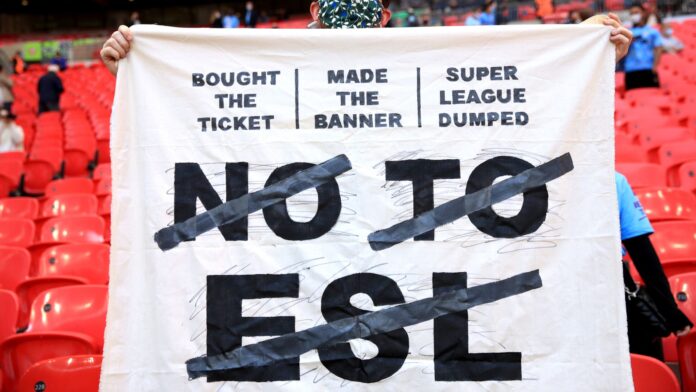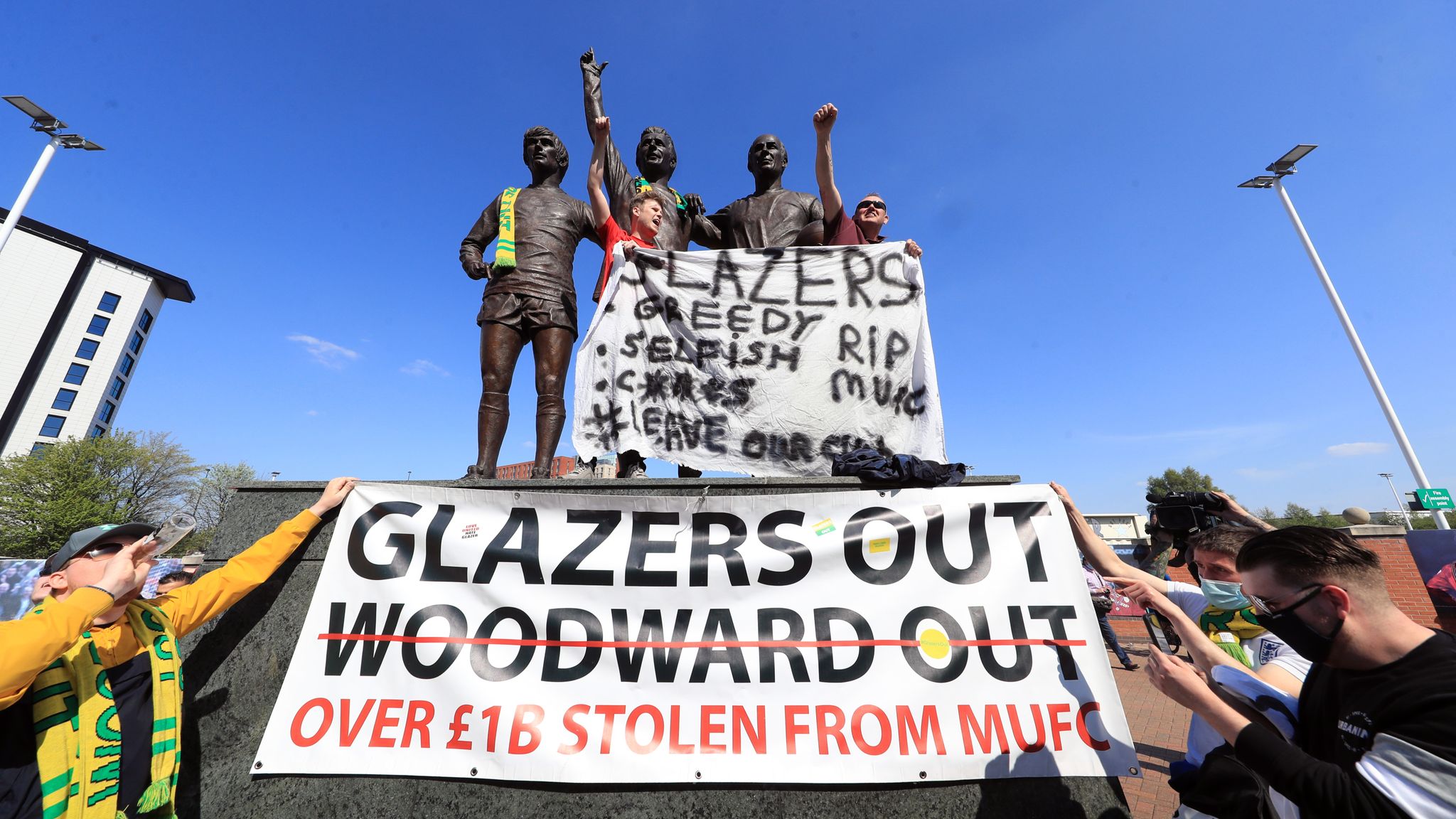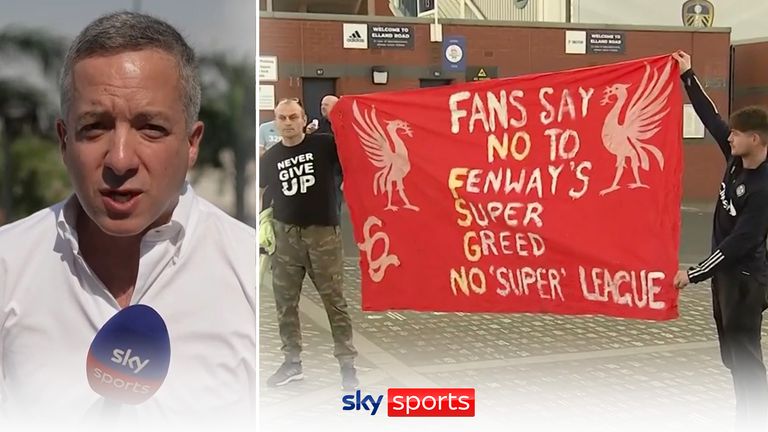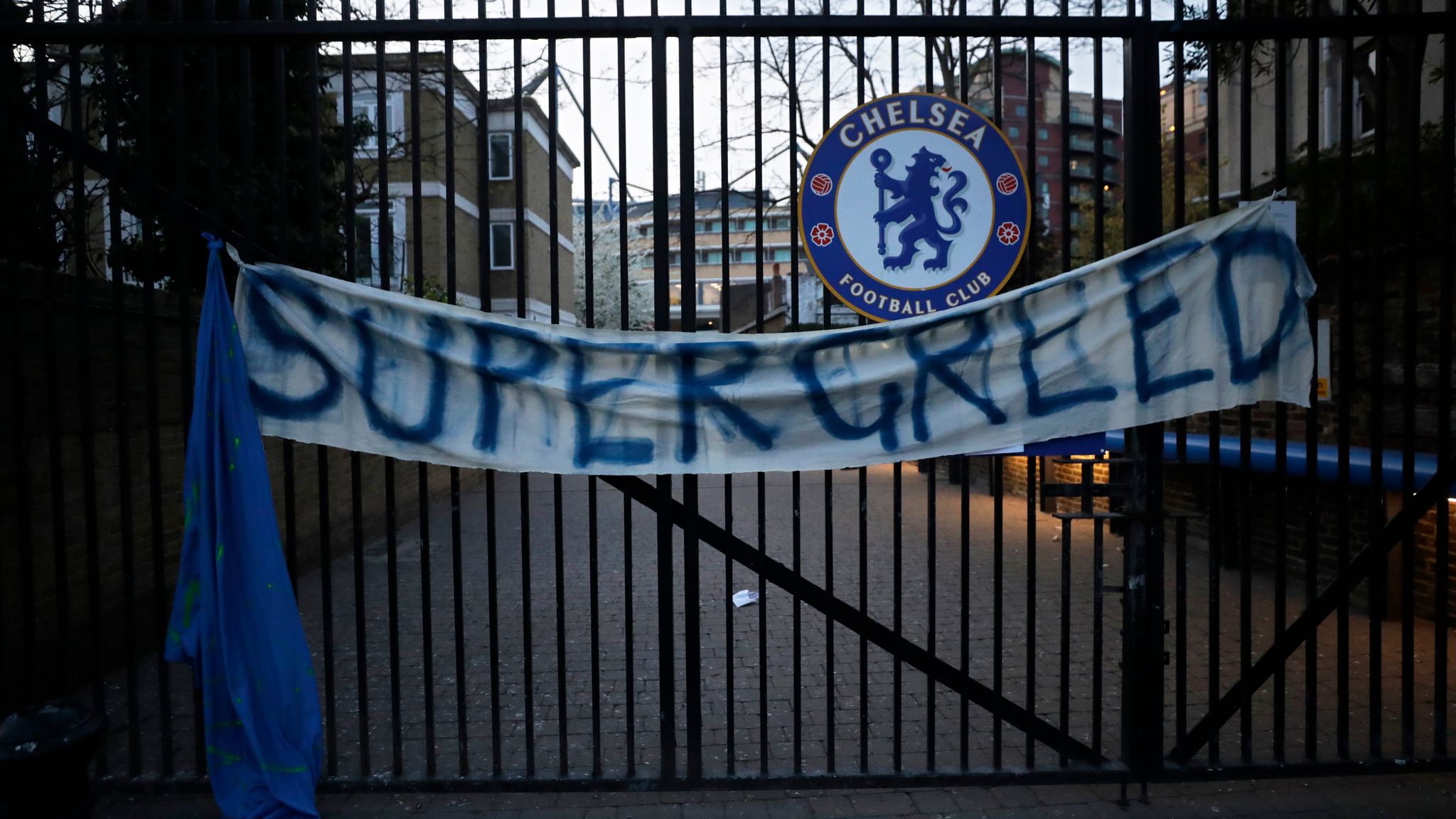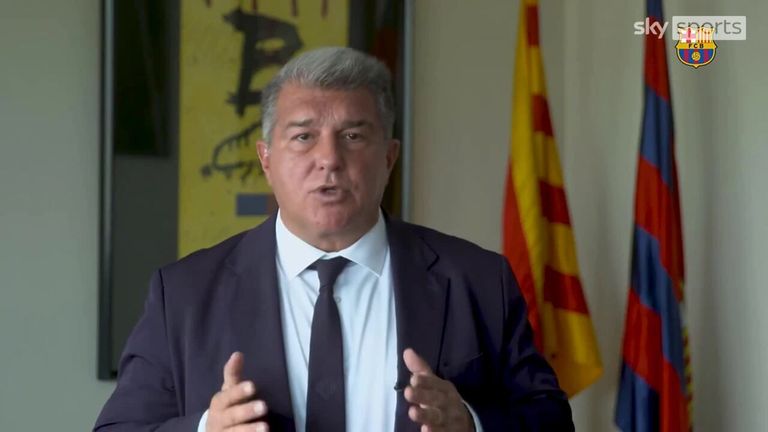Organisers behind the failed European Super League have revealed plans for a new competition that features promotion and relegation.
It comes after judges said UEFA rules blocking the formation of such a competition were contrary to EU law.
The initial plan for a European Super League was met with widespread fury when it was announced in April 2021 and included Manchester United, Liverpool, Arsenal, Chelsea, Tottenham and Manchester City.
Those plans collapsed within 72 hours of being announced – so what is different this time?
How would the new-look ESL work?
Bernd Reichart, chief executive of European Super League organisers A22, revealed details on how the competition would work on Thursday morning.
This included leagues for both men’s and women’s football – the latter of which had not previously been mentioned – and the process of promotion and relegation.
He also confirmed that the ESL intends for all of their games to be ‘free-to-air’ on their own streaming platform.
The league stages
The men’s group stage – named the ‘league stage’ – would involve 64 European clubs, divided into three tiers – Star, Gold and Blue.
Star – the top league – would involved 16 clubs, grouped into two teams of eight.
Gold – the second league – would be the same.
Blue – the third league – would have 32 teams, grouped into four teams of eight.
All leagues would play 14 matches per season – seven home and seven away.
The women’s league stage would feature 32 European clubs, divided into two tiers – Star and Gold. Like the men’s league, each would feature 16 clubs, grouped into two teams of eight.
The league stage would take place between September and April with fixtures played in midweek.
The knockout stage
In the men’s and women’s competitions, the top four teams from each group in the Star and Gold league will go through to the quarter-finals, meaning eight teams in each tier competing in the knockout stage.
There would also be an eight-team knockout stage in the men’s Blue league, with the top two teams in each group going through to the quarter-finals.
All knockout stages will have two-legged quarter-finals and semi-finals. The finals would be played in a neutral location, with the winners of each final crowned Star, Gold or Blue champions.
How would promotion and relegation work?
In the men’s and women’s Star league, the clubs who finish bottom of the two groups will be relegated to the Gold league.
In the men’s Gold league the two finalists would be promoted to the Star league. The teams at the bottom of the two Gold league groups will be relegated to the Blue league.
In the men’s Blue league, the finalists would be promoted to the Gold league. However, 20 of the 32 clubs will leave the league at the end of their campaign, and replaced by clubs depending on their domestic league performance.
However, Reichart added of teams’ ability to be promoted into the Blue league: “At this stage, more dialogue with clubs and leagues is necessary to work out the precise details.”
In the women’s Gold league, the two finalists would be promoted to the Star league. Four of the clubs will leave the league at the end of their campaign, and replaced by clubs depending on their domestic league performance.
What did the ECJ rule on Thursday?
At around 9am on December 21, the European Court of Justice (ECJ) ruled that UEFA and FIFA rules granting prior approval for new competitions are contrary to EU law, but added that the competition may still not be approved.
When the initial ESL proposals were announced in 2021, UEFA and FIFA acted against competition law by blocking the formation of the competition and then seeking to sanction the clubs involved.
A release issued by the court said such rules were “contrary to competition law and the freedom to provide services”.
A non-binding decision delivered by the Advocate General in the case last December found rules allowing UEFA to have prior approval of new competitions were compatible with EU law.
The original 2021 Super League proposal was criticised for its ‘closed’ format, with 15 founder clubs set to have been immune from relegation.
However, there are many obstacles still in A22’s path even if the judgement suggests it does have the right to pitch a new competition to UEFA that can operate under UEFA’s auspices, and for UEFA to give that competition full and fair consideration.
These include the will of clubs, existing agreements between the European Club Association and UEFA, and the fact that the existence of a joint venture between ECA and UEFA on commercial matters at the very least challenges A22’s assertions about a monopoly.
The Grand Chamber judgement’s interpretation of EU law will be passed back to a Madrid commercial court to make a decision, after the Spanish jurisdiction made the referral in 2021.
That court also placed an injunction on sanctions UEFA imposed on the nine clubs who joined the Super League but who later withdrew. It remains to be seen whether UEFA will press on with those sanctions, and potentially investigate more serious charges against Real Madrid and Barcelona.
Timeline: How did we get here?
‘Verdict could have huge ramifications for future of football in Europe’
Sky Sports News’ chief reporter Kaveh Solhekol:
“Two-and-a-half years ago, 12 of the biggest clubs in Europe tried to set up a European Super League and, straight away, they felt the full force of UEFA’s rules. UEFA came out and said they were not allowed to set up this league and if they did, they would punish the players and the clubs as well. Pretty quickly – and you have to factor in the effect the fans had – the clubs started melting away and within two or three days, the whole project had collapsed.
“Three clubs – Juventus, Barcelona and Real Madrid – kept fighting for the right to be able to set up a European Super League. Juventus dropped out earlier this year, which left Real Madrid and Barcelona. They set up a company called A22 Sports to carry on promoting the Super League project – and they also went to the courts.
“What they tried to do is prove that what UEFA and FIFA are doing is contrary to EU law, which says there should be free competition and free trade; there has to be a level playing field for everybody who wants to set up a business. What we’ve had for the past 70 years in Europe is that if you want to set up a European competition, it has to be done through UEFA.
“UEFA is in this strange position where they are the governing body of European football, but they are also a competition organiser and they make money from these competitions. What the European Super League company was doing by going to the European Court of Justice was saying ‘what UEFA is doing is anti-competitive, it is breaking EU laws and you must stop this’.
“Today, the 15 judges in the European Court of Justice’s Grand Chamber in Luxembourg came back in their verdict – and they were very strong in what they said. They said FIFA and UEFA’s rules on prior approval of new competitions are contrary to EU law and that rules stopping clubs and players playing in new competitions are unlawful. They also said the existing rules give FIFA and UEFA exclusive control and restrict competition and that FIFA and UEFA are abusing a dominant position.
“A very significant verdict from Luxembourg this morning, which could have huge ramifications for the future of football in Europe.”
Could the Premier League clubs join again?
A European Super League is a total non-runner without the involvement of English clubs and it would be impossible for them to join as things stand.
Page one of the Premier League handbook has the revised owners’ charter which states clearly:
“We are collectively committed to the Premier League and recognise our responsibility to support it. We will not engage in the creation of new competitive formats outside the Premier League’s rules”.
The UK government is also in the process of setting up an independent football regulator which will ban clubs from joining breakaway leagues.
Sky Sports News’ Geraint Hughes added: “An independent regulator for English football, coming under the Football Governance bill – my expectation is that will become law early next year – and part of the remit of that is: football clubs that want to play elite, professional football in this country have to have a licence.
“Part of that licence comes with conditions. One of those conditions is you cannot go off and play in a breakaway super league.”
Manchester United – one of the original clubs who signed up for the ESL before withdrawing – also said: “Our position has not changed. We remain fully committed to participation in UEFA competitions, and to positive cooperation with UEFA, the Premier League, and fellow clubs through the ECA on the continued development of the European game.”
How clubs and organisations have responded
Following the earlier ECJ ruling, A22 CEO Bernd Reichart posted on X, formerly known as Twitter: “We have won the #RightToCompete. The UEFA-monopoly is over. Football is FREE. Clubs are now free from the threat of sanction AND free to determine their own futures.
“For fans: We propose free viewing of all Super League matches. For clubs: Revenues and solidarity spending will be guaranteed.”
In their response, UEFA said the ruling “does not signify an endorsement or validation of the so-called ‘super league’; it rather underscores a pre-existing shortfall within UEFA’s pre-authorisation framework, a technical aspect that has already been acknowledged and addressed in June 2022”.
The statement continued: “UEFA is confident in the robustness of its new rules, and specifically that they comply with all relevant European laws and regulations.
“UEFA remains resolute in its commitment to uphold the European football pyramid, ensuring that it continues to serve the broader interests of society. We will continue to shape the European sports model collectively with national associations, leagues, clubs, fans, players, coaches, EU institutions, governments and partners alike.
“We trust that the solidarity-based European football pyramid that the fans and all stakeholders have declared as their irreplaceable model will be safeguarded against the threat of breakaways by European and national laws.”
FIFA added they would analyse the findings alongside UEFA. Their statement read: “FIFA has taken note of the ruling issued today by the Court of Justice of the European Union in relation to the European Superleague Company SL.
“FIFA will now analyse the decision in coordination with UEFA, the other confederations and the member associations before commenting further.
“In line with its Statutes, FIFA firmly believes in the specific nature of sport, including the pyramid structure – which is underpinned by sporting merit – and the principles of competitive balance and financial solidarity.
“Football owes its long and successful history to the above-mentioned principles, which FIFA, the confederations and the member associations will continue to promote in the future, in the interest of all football fans worldwide.”
Meanwhile, Barcelona said they “wish to express satisfaction” with the ruling.
Speaking in a televised statement, club president Joan Laporta said: “We believe that the time has come for clubs, and even more so for those that are owned by their members, such as Barcelona, to have greater control over their destiny, over their future and over their own sustainability.
“First of all, I want to make it very clear that Barca’s position on the matter of a new European league format is not intended to go against the Spanish league or against the national leagues in general. On the contrary, with a new, improved European competition and more resources for the clubs, the national league will become more balanced and competitive.
“What we want and what we will work towards achieving is to establish an open, constructive dialogue with the aim of generating positive and productive relationships between all parties.
“We believe that as of this moment, an historic opportunity is open to try to show some of the serious problem that currently jeopardise the future of the viability of the vast majority of clubs.
“In keeping with this idea, Barcelona try to promote innovative methods to try and improve European competitions in an open and fully meritocratic format, making football more sustainable for the clubs themselves, much more supportive of amateur football, more attractive and even more affordable for fans around the world.
“This proposal, I insist, aims to improve European football as a whole, both men’s and women’s.”
Source : Sky Sports



